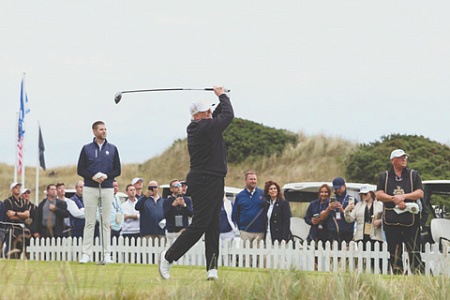
A new trade agreement between the United States and Vietnam is raising questions about the intersection of diplomacy and the private business interests of the Trump family. Coinciding with the new deal, Vietnamese authorities have allocated land near the capital, Hanoi, for the construction of a new golf course by the Trump Organization, leading to accusations that the business venture was a condition for favorable trade terms.
The project requires the displacement of local farmers, who have been offered compensation ranging from approximately $12 to $30 per square meter, plus a quantity of rice, for land that has sustained their families for decades. However, resistance is likely to be futile. In Vietnam, all land is state-managed, and the communist government can legally reclaim territories for development projects, a power it has used in the past to suppress dissent and push through industrial and tourism initiatives.
According to media reports, including from The Independent, the golf course deal was an unstated prerequisite for the new trade agreement signed on July 2. This agreement significantly benefits Hanoi by reducing U.S. tariffs on Vietnamese goods from a potential 46% to 20%. The economic advantages for Vietnam are seen as far outweighing any potential domestic backlash from the displaced farmers. The White House has consistently denied any link, stating that President Trump is disconnected from his company’s operations, which were placed in a blind trust in 2017. However, his sons, Eric and Donald Jr., continue to manage the family business.
This incident is being framed as another success for what has been termed Trump’s “golf diplomacy,” a strategy of leveraging his personal passion and business assets to forge international relationships. This pattern includes a recent trade agreement with the United Kingdom, reportedly solidified while playing golf with Prime Minister Keir Starmer, and a finalized trade deal with the European Union following a meeting with Commission President Ursula von der Leyen at a Trump golf club, which saw proposed tariffs on European goods halved.
Conversely, countries whose leaders are not within Trump’s personal favor appear to face a tougher U.S. stance. The administration has threatened Brazil with 50% tariffs amid the prosecution of former president Jair Bolsonaro, a friend and golf partner of Trump. Similarly, Switzerland, whose president does not play golf, is facing new 39% tariffs, reinforcing the perception that personal rapport and shared leisure activities play a significant role in Trump’s foreign policy calculus.
The Trump Organization is currently undergoing a major international expansion, with a dozen new foreign projects initiated since November 2024. While a 2025 ethics agreement prohibits the company from contracting directly with foreign governments, this rule is reportedly circumvented by using local partner companies as intermediaries. As President Trump continues to merge statecraft with the expansion of his family’s global brand, the Vietnam deal serves as a powerful new case study, potentially encouraging other nations to seek favor through opportunities that benefit the Trump Organization.
